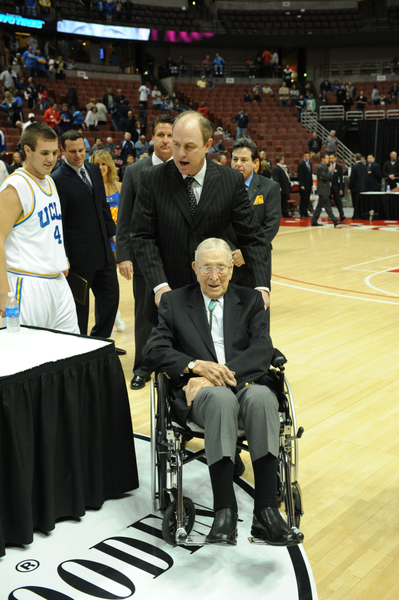Team of the 2000s: #7 – UCLA
Posted by rtmsf on August 12th, 2009Ed. Note: check the category team of the 2000s for our other entries in this feature.
As we were going through the list of candidates for the top programs of the 2000s, we found that teams tended to fall into similar statistical cohorts. Among the top twelve programs, we found three such delineations where teams within each group were largely indistinguishable, and our discussions over rankings got more intense as a result. The group involving #8-#12 was one such cohort, and as we’ve noted in the comments, the rankings within that group came down to slicing hairs. The next group where teams were very similar begins today with our seventh choice, and continues through to the fifth selection early next week.
#7 – UCLA
Overview. The nation’s program with the most all-time championships failed to win one during the 2000s, but under the wise direction of Ben Howland, integrity and pride was restored in Westwood during this period. Whereas Maryland, for example, started off the decade with a bang and ended on a whimper, UCLA took the opposite track. The decade for the Bruins began better than you probably remember under Steve Lavin, with disappointing regular seasons followed by runs to the Sweet Sixteen (as a #8 and #6 seed in two of those years), but then the bottom fell out – the Jason Kapono-led team of 2002-03 wilted during a nine-game midseason losing stretch to end up with the first sub-.500 season in Westwood in over fifty years. Out with much-maligned Lavin and in with the studious Ben Howland from Pittsburgh. After one year gaining traction (11-17) under the new regime, things have been on the uptick ever since, as UCLA has been to five straight NCAAs with three consecutive trips to the final weekend sandwiched in the middle. In two of those years, the Bruins ran into the buzzsaw Florida teams that went back-to-back: we often wonder whether UCLA would have cut down the nets had they avoided the Gators in either of those years. In terms of UCLA’s placement on our Team of the 2000s list, it’s clear that the dominance they showed in the NCAA Tournament from 2006-08 has had an effect on people to the extent that the two losing seasons were largely forgiven. Six trips to the second weekend and three trips to the final one, while doing so with a generally weaker seed than its contemporaries on the list, is enough for us. UCLA was the seventh best program of the 2000s.
Pinnacle. Since UCLA has yet to win the brass ring under Howland, we’re going to go with a well-known incident in the 2006 NCAA Tournament that announced to everyone in college basketball that UCLA was “back” and would have to be dealt with. You’ll remember it well. UCLA was down nine points with 3:26 to go against America’s mid-major darling, Gonzaga, and their NPOY candidate Adam Morrison. Gonzaga had been the dominant team for the entire game, but UCLA’s pressure defense was just getting started. When it was all said and done, UCLA had finished the game on an 11-0 run, Morrison was left crying on the floor of the Oakland Coliseum and pangs of long-dormant hatred were welling up across America for the celebrating team in white and gold. UCLA would go on to the NCAA finals where Florida cleaned their clock (Act 1), but Ben Howland had established UCLA as a national powerhouse once again and recruits started lining up at the gates. Let’s reminisce with Gus Johnson’s call, shall we?
Tailspin. A UCLA fan would reply with “the Steve Lavin era,” but that’s a little unfair from an objective viewpoint. In Lavin’s seven years at the helm, he took UCLA to four Sweet Sixteens and one Elite Eight in six NCAA appearances. Yet there was always a sense that his teams underachieved given the NBA talent they had on the floor (the fact that Lavin suffered ten losses of 25+ points supports this view). Still, the writing was on the wall during the 2002-03 season when UCLA started out 4-14 before rallying late to win eleven games (including a Pac-10 Tourney victory over #1 seed Arizona) – UCLA was on the ropes. Frankly, given the number of coaches that the Bruin program has gone through since the Wizard retired in 1975 (seven prior to Howland), it was no guarantee that their next hire would be a good one. Dan Guerrero made a shrewd choice in going with the rough-and-tumble style of Ben Howland – the rest of the Pac-10 wasn’t ready for Big East basketball on the west coast.
Outlook for 2010s: Grade: A+. It’s simply a matter of time before Howland hangs #12 up in Westwood. There’s an unbelievable amount of talent in Southern California, and now with USC and Arizona out of the way (for a while, at least), the Bruins should even further dominate the market. According to Scout’s team rankings, Ben Howland has brought in a top 25 class in each of his last five years at the school, and the last three years were all in the top twelve. And with six first-round NBA draft picks in the last four seasons, Howland has established a clear prep-to-pro pipeline that keeps young players interested in playing near the beach. Furthermore, Howland, at age 52, has no designs on another position. He’s stated numerous times that he’s currently coaching at his dream job, and unlike other coaches who shall remain nameless, we actually believe this guy. His next ten years should be the apex of his career, and UCLA should feel especially lucky to have gotten him.













































I like Ben Howland but his stubborness could eventually do him in someday.
Ben Howland will do fantastic things at UCLA. With his intensity and ability to get players to improve and to the next level, UCLA will be the team of the next decade.